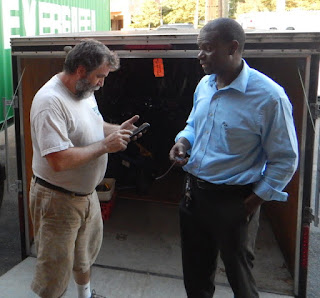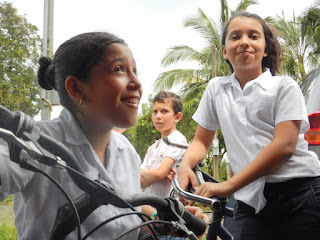For poor families in the middle of Appalachia Andy is absolutely like the Bike Santa...and unlike the guy from the North Pole, Andy delivers twice a year!
Working with his Kiwanis group out of Waldorf Maryland, Andy and group of mechanical helpers take donated kids bikes from Bikes for the World and they fix them up at his home in MD. This requires some tools, sweat, and quite a bit of fundraising to buy supplies to replace busted seats, flat tires, and rusty chains. It ain't easy playing Santa.
 |
| A young boy in Kentucky excited about his new bike |
It's also our motto at Bikes for the World, changing lives one bike a time. Andy took that and ran...all the way to Kentucky where the statewide poverty rates are staggering. Last year, over 31,000 school aged kids were homeless.
Families in Kentucky are affected weekly by new lay offs stemming from closing mines. Power companies are shuttering, the trucking industry is impacted. Retail down. Many families cannot afford food and rely on community food pantries. School supplies, clothes, and especially bikes are way down on their shopping lists.
 |
| A young volunteer in DC helps load bikes to be donated |
That was last year. Since then Bikes for the World has donated over 550 bikes to this domestic program. All of them passing through Andy's workshop before he drives them down to Pikeville for these very thankful kids. It's Andy and his team that makes this donation possible, delivering smiles to hundreds of kids every year.
If you can get Andy to stop for a second he is probably still busy telling you about the kids and families affected through this program. He has a supply of photos on his phone he will swipe through and still remember every story, every smile.
Jenniffer Matter brought her daughter to the give away last year for school supplies, which are also given out during the event. She said it's a relief to know where those items are coming from because they don't have the money to buy them.
"Whether it's a smile or a quarter it makes a difference."
 |
| Dad so thankful his girls received bikes he couldn't afford |
"We believe these bikes not only relieve stress, they help with health, promoting wellness, and fighting childhood obesity," Trissia Scott.
Parents and teachers agree. Giving kids an outlet after school where they don't have to worry and can go and just have fun riding a bike is a huge lift on their spirits. Parents also say they can use the bike as leverage to get that homework done quickly so the kids can go out and ride.















































